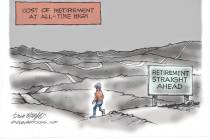EDITORIAL: Legislature must halt binding arbitration
The unsustainable growth of Nevada’s local government payrolls is a predictable result of local governments lacking direct control of their pay scales. More often than not, an unelected arbitrator in another state has the final say on what you pay your unionized public servants. More often than not, that arbitrator is sympathetic to labor’s interests, not yours.
Correcting this prolonged assault on accountability should be one of the top priorities of the 2015 Legislature. The Review-Journal has high expectations for the biennial regular session, which begins Feb. 2, so we are providing Gov. Brian Sandoval and lawmakers with 25 policy recommendations in 25 days. Our second proposal: making elected government boards, not unelected arbitrators, settle public employee contract disputes.
The Legislature instituted binding arbitration decades ago, with the idea that a neutral outsider was best-suited to fairly settle public-sector labor disputes. An arbitrator was supposed to serve as a disincentive for bad-faith bargaining because, ultimately, the process guarantees a loser.
Unfortunately, time and time again, Nevada’s taxpaying public is the loser in binding arbitration. Far from preventing bad-faith negotiations, too often arbitration rewards them because unions know the process also guarantees a winner. And when the person making that decision has absolutely no stake in the decision — when the arbitrator isn’t stuck with reduced services or higher taxes to pay for salary increases awarded to labor groups — the outcome generally reflects complete disconnection from the community affected by it.
Consider perhaps the most devastating arbitration ruling in recent Southern Nevada history. The Clark County School District, still reeling from the effects of the valley’s economic collapse and dangerously low on reserve funding, sought to impose pay freezes on teachers to preserve their jobs and maintain class sizes for the 2011-12 school year. The teachers union demanded pay raises based on seniority and continuing education credits, even though the administration warned that awarding those raises would require the elimination of about 1,000 positions for the 2012-13 school year. The union dug in, and the arbitrator sided with teachers. The jobs were axed and already-high class sizes increased. No one with skin in this community would have rendered such a decision.
Last year, an arbitrator denied money-losing University Medical Center the opportunity to save more than $122 million over 30 years by reducing compensation for future hires. The hospital is still on life support.
Elected bodies exist to oversee the governments funded by taxpayers and approve budgets that reflect service priorities. Council members, commissioners, school board trustees and others represent the interests of their constituents. It’s their job to decide what policies best serve their communities. The Legislature must eliminate binding arbitration.

25 ideas in 25 days
PREVIOUS: Legislature must make bargaining transparent
NEXT: Union dues























